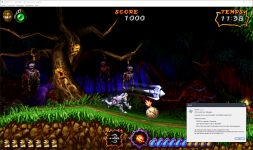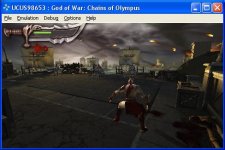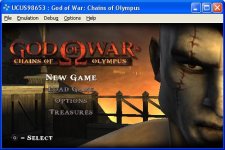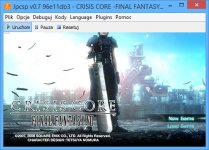You are using an out of date browser. It may not display this or other websites correctly.
You should upgrade or use an alternative browser.
You should upgrade or use an alternative browser.
PSP
PPSSPP v1.17.1 has released!
Feb 06
- 1,207
- 0
Very powerful, PPSSPP is a free and free Sony PSP emulator (for Windows, Android and others via SDL) written in C++ by Henrik Rydgard (very well known under the pseudonym of Ector, already author of the PSP emulator Potemkin and best known for Dolphin, having also worked on a number of Dreamcast emulators).

Changelog:

Changelog:
– Fixed green rendering errors on some PowerVR GPUs (#18781)
– Release all held keys on pause to avoid « stuck keys » after unpausing or in run-behind-pause (#18786)
- Fixed UI (#18785)
– Update libchdr with zstd support, warn the user about bad CHDs (#18824, #18803). more info
– Add workaround for AdHoc mode in Resistance (#18821)
– Fix graphics in Tokimeki Memorial 4 (#18822)
– Fix crash in UFC 2010 on Mali GPUs (#18813)
– Temporarily disable MSAA on Adreno GPUs due to crashing (#18819)
–...
PPSSPP v1.17 has released!
Jan 27
- 1,034
- 0
Very powerful, PPSSPP is a free and free Sony PSP emulator (for Windows, Android and others via SDL) written in C++ by Henrik Rydgard (very well known under the pseudonym of Ector, already author of the PSP emulator Potemkin and best known for Dolphin, having also worked on a number of Dreamcast emulators).

The changes are as follows:

The changes are as follows:
CHD support
CHD was originally a format for compressing hard drives from arcade games in MAME, but has become since the most popular format for storing ISOs for CD- and DVD-based video game consoles. PSP already has a different format, CSO, which can be used toilize loss-lessly compress ISOs, and as a bonus, unlike CHD, these actually work on the real hardware.
So you might ask, why support CHD? It does provide a slightly better compression ratio, but the main reason is that it’s simply asked a lot. Many people seem to familiarize with a set of tools, and since CHD works to...
PPSSPP v1.16.6 has released!
Oct 12
- 1,235
- 0
PPSSPP is a free and free-to-cart Sony PSP emulator (Windows, Android and other via SDL) written in C and C by Henrik Rydgard (very well known as Ector, author of the PSP Emulation Potemkin and especially known for Dolphin, who has also exercised over many Dream emulators).

Changelog:

Changelog:
– Fix performance issue with Vulkan descriptor set allocation
– Smoother loading of replacement textures
– Fix the store on iOS
– Fix problem with waves background
– Some translation updates
– Other fixed minor
PPSSPP v1.16.5 has released!
Sep 28
- 732
- 0
PPSSPP is a free Sony PSP emulator (for Windows, Android and others via SDL) written in C + + by Henrik Rydgard (well known under the pseudonym Ector, already author of the PSP emulator Potemkin and best known for Dolphin, having also worked on a number of Dreamcast emulators).

The changes are as follows:

The changes are as follows:
– Fix for crash when changing render backend in-game
PPSSPP v1.16.3 has released!
Sep 23
- 992
- 0
PPSSPP is a free Sony PSP emulator (for Windows, Android and others via SDL) written in C + + by Henrik Rydgard (well known under the pseudonym Ector, already author of the PSP emulator Potemkin and best known for Dolphin, having also worked on a number of Dreamcast emulators).


– Fix crash bug and performance issue in Vulkan shader cache ([#18183], [#18189])
– Fix crash in icon loading in homebrew store ([#18185])
– Add some memory safety check ([#18184], [#18194])
– Fix problem when changing backend from the Windows menu ([#18182])
PPSSPP v1.16.2 is released!
Sep 19
- 712
- 0
PPSSPP is a free Sony PSP emulator (for Windows, Android and others via SDL) written in C + + by Henrik Rydgard (well known under the pseudonym Ector, already author of the PSP emulator Potemkin and best known for Dolphin, having also worked on a number of Dreamcast emulators).
Changelog:
Changelog:
– Fix for HTTP support on Linux on networks with shaky or incomplete IPv6 support
– Assorted fixes for leaks and crashes ([#18169], [#18151])
– Fix hang when switching UMD with RetroAchievements enabled ([#18143])
– Fix math bug in new IR JIT for x86 ([#18165])
– Minor math optimization -fno-math-errno ([#18158])
– Fix for software renderer crash
PPSSPP v1.16.1 is released!
Sep 12
- 807
- 0
PPSSPP is a free Sony PSP emulator (for Windows, Android and others via SDL) written in C + + by Henrik Rydgard (well known under the pseudonym Ector, already author of the PSP emulator Potemkin and best known for Dolphin, having also worked on a number of Dreamcast emulators).
Changelog:
Changelog:
– Move RetroAchievements to the Tools tab in settings ([#18127])
– Fix graphics regressions in Hot Shots Golf 2 / Everybody’s Golf 2 and Final Fantasy Tactics ([#18142])
– Fix hang when switching UMD with RetroAchievements enabled ([#18143])
– Fix hang on startup with OpenGL, that happened often if « buffer commands » was set to off.
– Fix problem with the sc instruction that broke Beats ([#18133], [#18140])
– Fix problem with the chat window accidentally closing on typing X ([#18135])
– Fix some crashes, add some asserts and reporting hooks ([#18129])
– Fix some text rendering in the software renderer ([#18126])
PPSSPP v1.16 is released!
Sep 09
- 866
- 0
Very efficient, PPSSPP is a free Sony PSP emulator (for Windows, Android and others via SDL) written in C + + by Henrik Rydgard (well known under the pseudonym Ector, already author of the PSP emulator Potemkin and best known for Dolphin, having also worked on a number of Dreamcast emulators).
Changelog:
Changelog:
New JIT backends:
– RISC-V, based on IR
– x86 JIT based on IR. Often faster than the existing one.
Input fixes
– Improve behavior when analog and digital inputs clash ([#17960])
– Combo mapping is now disabled by default ([#17673])
– Android: Better tracking of devices names ([#17562], auto config)
– Fix mapping custom touch buttons to analog inputs ([#17433])
Rendering performance and fixes
– Fix flicker in WWE Smackdown vs Raw 2006 ([#18009]), video flicker in Naruto 2 ([#18008])
– Fix bad colors in Syphon Filter: Logan’s Shadow menu ([#17965])
– On lower-end devices, avoid « uber » shaders due to performance...
PPSSPP v1.15.3 Released
May 10
- 944
- 0
PPSSPP is advanced PSP emulator, that translates oryginal handheld CPU instructions into optimized x64 or ARM64 machine code using JIT recompilers. Thus it can run on quite low-spec hardware, including ARM-based phones and tablets with OpenGL ES 2.0 support.

Here are changes for latest build:
:: PPSSPP webite
:: Emulator on Github
:: PPSSPP related news at PSEmu.pl
:: More PSP emulation news at PSEmu.pl

Here are changes for latest build:
- Assorted minor crash- and other fixes;
- Android: Allow launch by content URI (for frontends);
- Control mapping: Fix bugs in mapping UI causing trouble with some controllers;
:: PPSSPP webite
:: Emulator on Github
:: PPSSPP related news at PSEmu.pl
:: More PSP emulation news at PSEmu.pl
PPSSPP 1.15.1 is released!
May 03
- 1,157
- 0
PPSSPP is a cross-platform PSP emulator. Visit PPSSPP official website for a full changelog as well as the downloads section for other platforms.
...
PPSSPP v1.15 is released!
Apr 30
- 1,050
- 0
Very powerful, PPSSPP is a free and open source Sony PSP emulator (for Windows, Android and others via SDL) written in C + + by Henrik Rydgard (well known under the pseudonym of Ector, already author of the PSP emulator Potemkin and best known for Dolphin, having also practiced on a number of Dreamcast emulators).
Stutter caused by shader compilation has been reduced drastically ([#16873])
– Parallelization: ([#16802], [#16804], [#16809], [#16812])
– Shader variant reduction: ([#16773], [#16778], [#16770], [#16763])
Rendering performance and fixes
– Integer scaling added ([#17224])
– Post-processing fixes ([#17262])
– SOCOM overlay glitch removed, night vision fixed ([#17297], [#17317])
– PowerVR compatibility fixes ([#17232])
– CLUT fixes ([#17212])
– ToP – Narikiri Dungeon X: Avoid GPU readback ([#17181], [#17191], [#17192])
– DTM / Toca: Avoid GPU readback ([#16715])
– Fixed Dante’s Inferno...
PPSSPP dev1.14.4-1074
Mar 26
- 1,184
- 1
PPSSPP is advanced PSP emulator, that translates oryginal handheld CPU instructions into optimized x64 or ARM64 machine code using JIT recompilers. Thus it can run on quite low-spec hardware, including ARM-based phones and tablets with OpenGL ES 2.0 support.

Here are changes for latest development builds:
:: PPSSPP webite
:: Emulator on Github
:: DevBuilds download page...

Here are changes for latest development builds:
- Core: Remove Host entirely;
- GPU: Add xfer flag to ignore create vfb flags
- Windows: Save console position on shutdown;
- Common: Reduce logging of system requests.
- GPU: Fix intra-block transfers in ToP CE. Used in Olive Village;
- GPU: Add xfer flag to ignore create vfb flags. Save icons need CPU reads to work;
- Debugger: Update symbols properly on prx load;
:: PPSSPP webite
:: Emulator on Github
:: DevBuilds download page...
PPSSPP v1.14.4 released!
Jan 03
- 990
- 0
PPSSPP can run your PSP games on your PC in full HD resolution, and play them on Android too. It can even upscale textures that would otherwise be too blurry as they were made for the small screen of the original PSP.
Even on modern Android phones and tablets, you can often run at double the original resolution.
Changelog:
Even on modern Android phones and tablets, you can often run at double the original resolution.
Changelog:
PPSSPP v1.14.3 released!
Jan 02
- 792
- 0
PPSSPP is advanced PSP emulator, that translates oryginal handheld CPU instructions into optimized x64 or ARM64 machine code using JIT recompilers. Thus it can run on quite low-spec hardware, including ARM-based phones and tablets with OpenGL ES 2.0 support.

Here are changes for latest build:
:: PPSSPP webite
:: Emulator on Github
:: PPSSPP related news at PSEmu.pl
:: PPSSPP files repository for Android, iOS, macOS and...

Here are changes for latest build:
- Several crash/hang fixes;
- Minor UI fixes;
- Fix confirm/cancel button reversal;
:: PPSSPP webite
:: Emulator on Github
:: PPSSPP related news at PSEmu.pl
:: PPSSPP files repository for Android, iOS, macOS and...
PPSSPP v1.14.2 is released!
Dec 31
- 783
- 0
PPSSPP is a fast and portable PSP emulator for Android, Windows, Mac, and Linux, written in C++.
Changelog:
Changelog:
-
Fix Toca/DTM and others (culling) on Mali again ([#16645])
[*]Fix line rendering bugs in the homebrew Tempest clone Webfest ([#16656])
[*]Assorted cleanup and bugfixes ([#16673], [#16662], [#16655], [#16644], [#16636], [#16639] etc)
PPSSPP - PPSSPP - PSP emulator for Android, Windows, Linux, iOS, MacOSX
PPSSPP is the leading PSP emulator for Android, Windows, Linux, Mac and more.
www.ppsspp.org
PPSSPP v1.14.1 released!
Dec 22
- 952
- 0
PPSSPP v1.14.1 is released. PPSSPP is a fast and portable PSP emulator for Android, Windows, Mac, and Linux, written in C++.
Changelog:
Changelog:
(NOTE: 1.14.1, released on December 20, fixes a black screen bug on older Android devices, plus some other odds and ends)
PPSSPP - PPSSPP - PSP emulator for Android, Windows, Linux, iOS, MacOSX
PPSSPP is the leading PSP emulator for Android, Windows, Linux, Mac and more.
www.ppsspp.org
PPSSPP dev1.13.2-2225
Dec 03
- 1,084
- 0
PPSSPP is advanced PSP emulator, that translates oryginal handheld CPU instructions into optimized x64 or ARM64 machine code using JIT recompilers. Thus it can run on quite low-spec hardware, including ARM-based phones and tablets with OpenGL ES 2.0 support.

Here are changes for latest development builds:
:: PPSSPP webite
:: Emulator on Github
...

Here are changes for latest development builds:
- Add savestate checkpoints to verify that MEASURE and WRITE match;
- OpenXR HUD support for even more games;
- Reserve some space in the checkpoints vector;
- Add a NOOP state to reduce logspam after error;
- Better handling infnan fog coefficients in softgpu;
- Cull verts outside post-viewport Z in softgpu;
- Optimize out texture proj for UVs;
- Handle infnan fog coefficients better;
- Fix wrong vreinterpret neon intrinsic usage
:: PPSSPP webite
:: Emulator on Github
...
PPSSPP dev.1.12.3-1082
Apr 22
- 1,310
- 0
PPSSPP is advanced PSP emulator, that translates oryginal handheld CPU instructions into optimized x64 or ARM64 machine code using JIT recompilers. Thus it can run on quite low-spec hardware, including ARM-based phones and tablets with OpenGL ES 2.0 support.

Here are changes for latest development builds:
:: PPSSPP webite
:: Emulator on...

Here are changes for latest development builds:
- Move IO checks to saving thread;
- Prevent save textures if not replacing;
- Save textures using a memory copy on Vulkan;
- Allow saving const tex levels on Vulkan;
- Save textures on background tasks when texture dumping is enabled;
- Fix hang when choosing "Skip" in first-time init;
- Disable not needed anymore workaround for Crash Team Racing;
- Add contributed data about a couple of prototypes to auto-expand memory to 64MB;
- UWP crashfix - serialize accesses to each loader;
:: PPSSPP webite
:: Emulator on...
JPCSP dev.935ea155
Apr 15
- 1,500
- 0
Jpcsp is written in Java advanced PlayStation Portable emulator. Matching the PSP dual-core architecture, Jpcsp takes full advantage of dual-core processors and supports powerful GPUs for displaying enhanced graphics.

Here are changes for latest development builds:
:: JPCSP Homepage
:: Emulator code on Github
:: Grab official emulators builds
:: JPCSP news post covered by PSEmu.pl

Here are changes for latest development builds:
- Fixed vertex cache where the last 2 bytes of a vertex buffer were sometimes lost;
- Improved shader rendering for overlapping primitives;
- Avoid NullPointerException when showing Debugger in some cases;
- OpenGL: trying to fix issues when resizing the display in the middle of the rendering;
- Fixed few comments;
:: JPCSP Homepage
:: Emulator code on Github
:: Grab official emulators builds
:: JPCSP news post covered by PSEmu.pl
PPSSPP dev.1.12.3-1018
Mar 28
- 1,497
- 0
PPSSPP is a written in C++ PSP emulator, that translates oryginal handheld CPU instructions into optimized x64 or ARM64 machine code using JIT recompilers. Thus it can run on quite low-spec hardware, including ARM-based phones and tablets with OpenGL ES 2.0 support.

Here are changes for latest development builds:

Here are changes for latest development builds:
- Fix inconsistency issue in Adhoc support between Windows and non-Windows;
- Increase the timeout when the connection to the AdhocServer is already in progress, avoids cutting off the connection if it took longer than expected but almost completed;
- Added a function to get SO_ERROR on a socket;
- Updated getLocalIp function to detects local IP better;
- Use the most recent posix socket id during blocking simulation, since there is a possibility for the socket id to changes after recreated;
- Recreate the socket before attempting to connect again after ECONNREFUSED/ENETUNREACH error, since...
